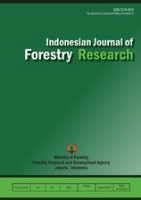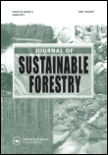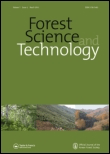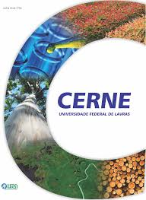
BALTIC FORESTRY
Scope & Guideline
Pioneering Knowledge for Sustainable Forestry Practices
Introduction
Aims and Scopes
- Forest Management Practices:
Research addressing various forest management strategies and their impacts on biodiversity, ecosystem health, and timber production. - Ecological Studies:
Investigations into the ecological dynamics of forest ecosystems, including species interactions, habitat preferences, and community structures. - Forest Health and Pathology:
Studies focusing on the health of forests, including the impacts of pests, pathogens, and environmental stressors on tree species. - Biodiversity Conservation:
Research aimed at understanding and preserving forest biodiversity, including studies on flora and fauna in various forest types. - Climate Change Impact:
Analyses of how climate change affects forest ecosystems, including growth patterns, species distribution, and forest resilience. - Innovative Forestry Techniques:
Development and assessment of new methods and technologies for forest management, including genetic studies and propagation techniques. - Socio-Economic Aspects of Forestry:
Explorations of the socio-economic dimensions of forestry practices, including the role of forests in local economies and community engagement.
Trending and Emerging
- Forest Ecosystem Resilience:
There is an increasing emphasis on understanding the resilience of forest ecosystems in the face of climate change and anthropogenic pressures, highlighting the need for adaptive management strategies. - Invasive Species Research:
Recent publications show a growing focus on the impacts of invasive species on native forest ecosystems, reflecting heightened awareness of biodiversity conservation challenges. - Genetic and Environmental Variability:
Research exploring genetic diversity and environmental responses in forest species is trending, which is critical for breeding programs and enhancing forest resilience. - Urban Forestry and Green Spaces:
Studies on urban forestry and the role of green spaces in urban environments are gaining traction, indicating a recognition of the importance of forests in urban planning and public health. - Ecological Restoration Techniques:
Research on innovative restoration techniques for degraded forest ecosystems is emerging, as practitioners seek effective methods to rehabilitate and enhance biodiversity in these areas.
Declining or Waning
- Traditional Timber Production:
Papers focusing solely on traditional timber production methods and yields are becoming less frequent, possibly as the focus shifts towards more sustainable and multifaceted approaches to forest management. - Historical Land Use Studies:
Research specifically examining historical land use impacts on current forest conditions is less common, indicating a potential shift towards more contemporary and forward-looking studies. - Single Species Studies:
There is a noticeable decline in studies concentrating on single species management, as the journal increasingly emphasizes ecosystem-level approaches and interactions among multiple species. - Conventional Pest Control Methods:
Research on conventional pest control methods is waning, likely due to a growing interest in integrated pest management and biological control strategies. - Static Biodiversity Surveys:
Surveys that merely catalog species without addressing ecological interactions or management implications are becoming less prevalent, reflecting a trend towards more dynamic and applied research.
Similar Journals

BOSQUE
Bridging Theory and Practice in Forestry ScienceBOSQUE, published by Universidad Austral de Chile, Facultad de Ciencias Forestales, stands as a pivotal platform for advancing the field of forestry and related environmental sciences. With an ISSN of 0717-9200, this journal has been committed to disseminating original research, reviews, and case studies essential for understanding forest ecosystems and management practices since its inception in 2006. As of 2023, it holds a Q3 ranking in the forestry category, showcasing a significant yet developing influence in the broader academic landscape, evidenced by its Scopus ranking placing it at the 12th percentile in Agricultural and Biological Sciences - Forestry. While boasting a diverse range of articles, BOSQUE promotes open access to a growing community of researchers, professionals, and students eager to contribute to sustainable forest management and conservation efforts. The journal continues to foster critical dialogue and innovation, making it an invaluable resource for those dedicated to enhancing forest sciences.

Madera y Bosques
Championing Biodiversity and Climate ResilienceMadera y Bosques is a prominent academic journal specializing in the fields of forestry and wood science, published by INST ECOLOGIA A C in Mexico. With an ISSN of 1405-0471 and an E-ISSN of 2448-7597, it has established itself as a vital platform for disseminating research findings, innovative practices, and methodologies pertinent to sustainable forest management and ecological conservation. Operating since 2008, the journal covers a wide scope of topics related to the complexities of forest ecosystems, the importance of biodiversity, and the challenges posed by climate change. Despite its categorization in Q4 for the year 2023 in the Forestry category, Madera y Bosques aims to elevate discourse and practice in the field, providing a voice to emerging researchers and seasoned professionals alike. Additionally, the journal adheres to open access principles, enhancing the visibility and accessibility of its articles to a global audience. Researchers and practitioners are encouraged to engage with its rich content to further their understanding and impact in the world of forestry.

Indonesian Journal of Forestry Research
Advancing sustainable forestry through innovative research.The Indonesian Journal of Forestry Research is a distinguished, peer-reviewed academic journal published by the Ministry of Environment & Forestry of Indonesia. With an ISSN of 2355-7079 and E-ISSN 2406-8195, this journal has been an Open Access platform since 2014, fostering international collaboration and knowledge sharing in the fields of ecology and forestry. As of 2023, the journal holds a respectable Q3 category in both Ecology and Forestry, reflecting its contribution to the science community. It ranks #99/174 in Forestry and #305/461 in Ecology in Scopus, indicating its growing influence in the respective fields. Aimed at researchers, professionals, and students, the Indonesian Journal of Forestry Research provides vital insights and findings, supporting sustainable forestry practices and environmental management in Indonesia and beyond. With an emphasis on innovative methodologies and applied research, this journal stands as a pivotal resource for those dedicated to advancing forestry science and ecological research.

CANADIAN JOURNAL OF FOREST RESEARCH
Fostering collaboration for a sustainable future in forestry.Canadian Journal of Forest Research (ISSN: 0045-5067, E-ISSN: 1208-6037), published by Canadian Science Publishing, stands as a leading platform for disseminating cutting-edge research in the field of forestry and ecological sciences. With an impressive impact factor and a steady reputation for high-quality publications, this journal occupies a prestigious position indicated by its Q1 ranking in Forestry and Q2 in Ecology as of 2023, alongside commendable placements in global and planetary change studies. Covering a broad scope from sustainable forest management to the impacts of climate change on forest ecosystems, the journal encourages submissions that address contemporary challenges and innovations in forest research. Operating from its base in Ottawa, Canada, the Canadian Journal of Forest Research has been a cornerstone of academic discourse since 1974, offering researchers and professionals vital access to pioneering studies that inform policy and practice in forestry. Researchers, educators, and students alike will find this journal an indispensable resource for advancing knowledge and fostering collaboration in the vital realm of forest research.

Central European Forestry Journal
Exploring the depths of Central European forestry science.Central European Forestry Journal, published by SCIENDO, is a pivotal platform dedicated to advancing research and knowledge in the field of forestry. Since its inception in 2009, this Open Access journal has provided scholars and practitioners with unrestricted access to cutting-edge research findings, promoting collaboration and innovation within the forestry community. Based in Poland, the journal serves as a crucial resource for researchers, professionals, and students alike, addressing critical topics relevant to the management, conservation, and sustainable utilization of forest resources. The journal holds a commendable Q2 ranking in Forestry, with a notable rank of 51 out of 174 and a 70th percentile in Scopus's Agricultural and Biological Sciences category. With converged publication from 2017 to 2024, the Central European Forestry Journal represents an essential avenue for disseminating knowledge and fostering dialogue in an increasingly important field.

Journal of Sustainable Forestry
Advancing sustainable practices for a greener tomorrow.Journal of Sustainable Forestry is a premier academic publication dedicated to advancing knowledge and practices in the field of sustainable forestry and environmental management. Published by Taylor & Francis Inc in the United Kingdom, this journal has been a cornerstone for researchers and professionals since its inception in 1992. With an impressive reputation, it boasts a 2023 Q2 ranking in Food Science, Forestry, and Geography, Planning and Development, highlighting its significant contribution to interrelated disciplines. The journal’s impact is further underscored by its Scopus ranking, especially in Forestry where it holds the 43rd position out of 174 publications, placing it in the 75th percentile. Although not open access, the journal remains committed to providing innovative research and practical insights into forest management, ecological sustainability, and policy development. As the field of sustainable forestry continues to evolve, the Journal of Sustainable Forestry serves as an essential resource for those committed to advancing sustainable practices globally, fostering a deeper understanding of how sustainable forestry can contribute to environmental resilience and biodiversity conservation.

Lesnoy Zhurnal-Forestry Journal
Exploring the Frontiers of Forestry ScienceLesnoy Zhurnal-Forestry Journal is a prominent academic publication dedicated to advancing the field of forestry and environmental sciences. Published by the Northern Arctic Federal University M. V. Lomonosov, this journal focuses on innovative research, practices, and policies related to forestry management and conservation. With an Open Access model established since 2015, the journal ensures widespread dissemination of knowledge and foster collaborative research across global scholarly communities. Located in Arkhangelsk, Russia, the Lesnoy Zhurnal appeals to researchers, professionals, and students alike, providing a platform for sharing valuable insights and addressing emerging challenges in forestry. Though specific metrics like HIndex and Scopus rankings are presently unlisted, the journal is committed to excellence and aims to enhance its visibility and impact within the scientific community. This publication is not only a critical resource for ongoing research but a key player in shaping sustainable forestry practices in a rapidly changing environment, making it indispensable for anyone involved in forestry and environmental studies.

Reports of Forestry Research-Zpravy Lesnickeho Vyzkumu
Innovating forestry science for global ecological impact.Reports of Forestry Research-Zpravy Lesnickeho Vyzkumu, published by the FORESTRY & GAME MANAGEMENT RESEARCH INST in the Czech Republic, serves as a vital forum for the exploration and dissemination of cutting-edge forestry research. With an ISSN of 0322-9688 and an E-ISSN of 1805-9872, this journal provides insights into various dimensions of forestry, nature conservation, and environmental sciences, contributing to both regional and global ecological discourses. Although currently categorized in the Q4 quartiles for Forestry and Nature and Landscape Conservation as of 2023, the journal aims to foster collaboration among researchers, professionals, and students devoted to sustainable forest management practices. The Scopus rankings reveal its position within the environmental science community, highlighting its role in addressing pressing ecological challenges. As the field continues to evolve, Reports of Forestry Research anticipates growth in accessibility and relevance, an essential resource for those committed to advancing forestry science and conservation efforts.

Forest Science and Technology
Exploring the intersection of forestry and technology for a greener future.Forest Science and Technology is a premier open access journal published by Taylor & Francis Ltd, based in the United Kingdom. Established in 2005, this journal has become a key platform for disseminating high-quality research in the fields of Forestry and Environmental Science, maintaining a strong impact factor and impressive Scopus rankings. As of 2023, it proudly holds a Q2 quartile ranking in Forestry and a Q3 quartile ranking in Management, Policy, and Law categories, highlighting its significance in addressing contemporary challenges in forest management and conservation. With a dedication to fostering scholarly communication, the journal supports open access since 2017, making valuable findings accessible to a wider audience, including researchers, professionals, and students. With the coverage period extending to 2024, Forest Science and Technology continues to contribute to the discourse on sustainable forestry practices and innovative management strategies.

Cerne
Exploring Innovations in Forest Management and BiodiversityCerne is a distinguished open-access journal dedicated to advancing knowledge in the field of forestry, published by the Universidade Federal de Lavras (UFLA). Since its inception in 1994, the journal has actively contributed to the global discourse on sustainable forest management and biodiversity conservation, presenting research findings that are both relevant and impactful. With its ISSN 0104-7760, Cerne aims to foster collaboration among researchers, professionals, and students, enhancing the understanding of forestry practices in Brazil and beyond. As of 2023, it holds a respectable Q3 ranking in the forestry category, further cementing its position within the academic community, illustrated by a Scopus ranking of #97 out of 174 in the Agricultural and Biological Sciences - Forestry field. Operating under an open-access model allows for wide dissemination of research outputs, ensuring that critical findings reach a broad audience, fueling further innovation and discovery in the field. With converged years extending from 2007 to 2024, Cerne continues to be a vital resource for anyone engaged in forestry research and practices.